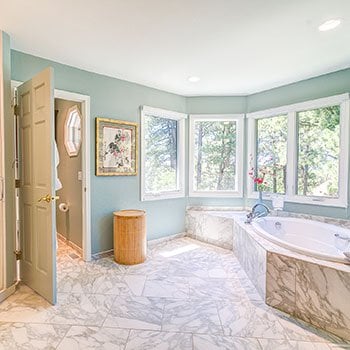In a perfect world, real estate agents would like every home be in perfect condition. Unfortunately, even homes that appear to be in pristine condition can have serious problems under the hood. This is why we recommend a property inspection to both our home buying and home selling clients. We even recommend it on new construction. After you receive the inspection report, there are some key strategies for approaching the home inspection negotiation.
What is Covered in a Home Inspection?
 The real estate law in Colorado is designed to protect both the Buyer and the Seller. This is most evident in home inspections. In the real estate contract, it is spelled out that the Buyer has the right to have a professional inspection of the following systems:
The real estate law in Colorado is designed to protect both the Buyer and the Seller. This is most evident in home inspections. In the real estate contract, it is spelled out that the Buyer has the right to have a professional inspection of the following systems:
- Roof, walls & structural integrity
- Electrical, plumbing, HVAC and other mechanical systems
- Physical conditions of any inclusions of the contract
- Services to the property including utilities & communication services
- Any proposed or existing transportation project, road, street or highway
- Any other activity, odor or noise on or off the property and its effect or potential effect on the property or occupants
It will take multiple inspectors or inspections to cover all of these specialized fields.
Types of Unsatisfactory Conditions
We always recommend using a certified professional inspector for your property inspection. This type of inspector will provide you and your REALTOR® with a report of the inspection. This inspection report will contain a list of items that require attention or are designated as unsatisfactory. These items generally fall into one of the following four categories:
- Repair/Replace: This category is for broken or damaged items.
- Mitigate-Hazardous Conditions: Radon, Mold, odors or pests fall into this category
- Provide Historical Background: This is used when the inspector sees something that appears to have been damaged and/or repaired in the past. If the inspector cannot make an assessment without further damaging walls or flooring, they will ask the Seller for more information.
- Further Evaluation: Most likely your home inspector is a generalist. If something on the inspection raises a red flag but falls outside of the inspector’s “field of expertise”, they will recommend further evaluation by another specialized licensed professional. This usually pertains to electrical, plumbing or structural issues.
The Home Inspection Negotiation
After a thorough review of the inspection report, the Buyers should meet with their REALTOR® in order to formulate a plan of action for the home inspection negotiation. It is important to establish 2 different things:
- Overall Home and Property Condition – There are times when there are just too many issues and unsatisfactory items. Sometimes it makes sense to terminate the contract without any further negotiations or attempts at finding a resolution. While rare, it happens.
- Unsatisfactory Inspection Items – It is best to start to prioritizing this list in order to present to the Seller’s agent.
- Health and safety issues – things like radon, mold or asbestos. Since mitigation on things like this can be costly, we address them first.
- Building code violations, construction defects, and materials that may have been part of any class action suits. This protects the buyer from getting stuck with any serious financial burdens down the road.
- Deferred maintenance – things like furnaces, exterior grading, and roofs. These are items that can become issues due to replacement costs or uninsurability.
Once the buyer decides on which items need to be addressed, the REALTOR® will put together a document called Notice of Unsatisfactory Conditions. This document outlines any concerns the Buyer voiced as well as proposed remedies. Many times the REALTOR® will include a copy of the actual inspection report to help the Seller’s agent clarify what the request is addressing. This needs to be delivered to the seller’s REALTOR® prior to the inspection objection deadline.
The Ball is Now in The Seller’s Court
 Once the Notice of Unsatisfactory Conditions is delivered to the Seller, they will review what the repairs or remedies will cost. In many cases, the Seller’s agent will need to get bids in order to realistically give the Seller an accurate idea of how much money the inspection items will cost. When Seller understands the cost and scope of the requested inspection items, they have some decisions to make by the Inspection Resolution Deadline:
Once the Notice of Unsatisfactory Conditions is delivered to the Seller, they will review what the repairs or remedies will cost. In many cases, the Seller’s agent will need to get bids in order to realistically give the Seller an accurate idea of how much money the inspection items will cost. When Seller understands the cost and scope of the requested inspection items, they have some decisions to make by the Inspection Resolution Deadline:
- Accept the objection and proceed with repairs
- Reject the request entirely or further negotiate with the Buyer by proposing an alternative resolution. This negotiation is done with a form called “Sellers Alternative Resolution”.
If the Seller accepts the Inspection Objection and chooses to move forward with the repairs, the deal remains intact and the Buyer is still Under Contract. On the other hand, if the Seller chooses to reject the request or looks for an alternate resolution, the Buyer can:
- Reject the Alternative Resolution. This means walking away from the deal with their earnest money intact.
- Accept the Alternative Resolution.
- Move forward knowing the seller will not do any repairs
Note: If the Buyer rejects the Alternative Resolution, they are not in default, so they retain their earnest money.
The Human Part of the Negotiation
 While the overall process seems clear, it is often emotional and can get tense. The property is the Seller’s personal home, and the Buyer is pointing out problems. Granted, some buyers nit-pic just to get a better price, but most are just trying to minimize the money and time they will have to spend once in the house. Sellers on the other hand often feel like Buyers are asking for too much and will start questioning whether this was the right offer to accept.The process can be problematic. A good REALTOR® will prepare their clients for this beforehand. Experienced REALTORS® will help both sides find a balance that works for each party. By being willing to help both the buyer and the seller to navigate this process, they keep the deal intact.
While the overall process seems clear, it is often emotional and can get tense. The property is the Seller’s personal home, and the Buyer is pointing out problems. Granted, some buyers nit-pic just to get a better price, but most are just trying to minimize the money and time they will have to spend once in the house. Sellers on the other hand often feel like Buyers are asking for too much and will start questioning whether this was the right offer to accept.The process can be problematic. A good REALTOR® will prepare their clients for this beforehand. Experienced REALTORS® will help both sides find a balance that works for each party. By being willing to help both the buyer and the seller to navigate this process, they keep the deal intact.
Smart Strategies for the Home Inspection Negotiation
The best strategy when approaching a property inspection is almost always conditional on the state of the real estate market.
Negotiating in a Buyer’s Market
If it is a strong Buyer’s market (market times are greater than six months), it’s unlikely there is a lot of interest or multiple offers for a property. In this case, home sellers are more inclined to thoughtfully consider a Buyer’s inspection objection requests.
Negotiating in a Seller’s Market
On the other hand, if we are in a strong Seller’s market, the chances are pretty good there is a lot of interest in the property. In this case, the Sellers are likely to be less inclined to deal with lengthy repair lists and potential delays to the closing. During strong Seller’s markets, Buyers often feel like they got the short end of the stick. Once again this is a good discussion to have with your REALTOR®. No matter what type of market we’re in, it’s always important to treat the home sellers with respect. Buyers often forget they are looking at re-sale homes and not brand new homes. It feels unreasonable to bring a laundry list of wear and tear repair items to a Seller on an older home. Before listing a home, wear and tear and cosmetic issues should be addressed by the Seller’s agent when the home is priced. The inspection is intended to discover issues that weren’t disclosed by the Seller, presumably because they didn’t know about them.
How to Guarantee the Quality of Repairs
 Another important point to consider is structuring the items you asked for by considering how to measure the quality of the repair. For example, for a plumbing issue, the objection can state: “Seller to have leaking pipes repaired by licensed plumber”. Asking for a repair like this makes a lot of sense. In the first place the house shouldn’t have leaking pipes. Secondly, this kind of repair isn’t something the home seller should necessarily do on their own. By stipulating “licensed plumber”, if there’s a problem with the work the home buyer can ask the plumber to come back and make it right. Conversely, let’s say the Buyer objects to the condition of the caulk in the shower. The REALTOR® can’t really address the quality in a request like this. There’s no license for someone who does caulking work. This is something the homeowner should address after taking possession of the home.
Another important point to consider is structuring the items you asked for by considering how to measure the quality of the repair. For example, for a plumbing issue, the objection can state: “Seller to have leaking pipes repaired by licensed plumber”. Asking for a repair like this makes a lot of sense. In the first place the house shouldn’t have leaking pipes. Secondly, this kind of repair isn’t something the home seller should necessarily do on their own. By stipulating “licensed plumber”, if there’s a problem with the work the home buyer can ask the plumber to come back and make it right. Conversely, let’s say the Buyer objects to the condition of the caulk in the shower. The REALTOR® can’t really address the quality in a request like this. There’s no license for someone who does caulking work. This is something the homeowner should address after taking possession of the home.
How to Feel Like You’ve Won the Home Inspection Negotiation
It’s important to be reasonable and pragmatic when preparing your inspection objection request. It’s also important to consider the condition of the market in conjunction with the severity of the items you’re considering. Your REALTOR® should counsel you as to what’s appropriate and what’s being too picky or inappropriate. Oftentimes, home buyers feel like their REALTOR® is advocating for the home seller during this negotiation. If you feel this way it’s really important to discuss this with your REALTOR®. For example, you might ask questions like: ”You seem to be uncomfortable with the things I’m asking for. Am I being unreasonable?” or “ If this was your house what would you ask for?” At the end of the day, inspection objections are difficult. Market dynamics and human emotions just throw fuel on the fire. Next to negotiating the price, the home inspection negotiation is the most important hurdle to get over in order to have a successful transaction. We think it’s important to discuss this with your REALTOR® before making an offer. When it comes time to negotiate with the home sellers, you and your REALTOR® should have an understanding of what’s reasonable as well as what’s important to you. One final thought on the home inspection negotiation – if you’re not going to be happy with your purchase, you probably shouldn’t buy the house.


